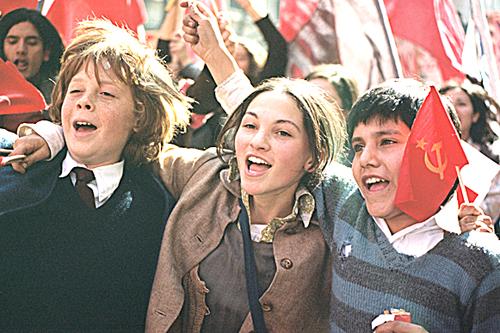Latin American Film Festival

Machuca, a film from Chile directed by Andres Wood. Courtesy of Colleen Cook
Feb 22, 2007
In the midst of Oscar season, the Champaign-Urbana community will have a chance to see some films produced outside of Hollywood. Boardman’s Art Theatre, 126 W. Church St., will host the first annual Latin American Film Festival Feb. 23 through March 1.
Five films representing five countries were chosen out of a pool of 20 by Angelina Cotler, associate director of the Center for Latin American and Caribbean Studies.
“I selected films that not only received awards but are in different genres of film,” she said. “I wanted to show different styles of film from Latin America.”
“Iluminados por el Fuego” (“Blessed by Fire”) from Argentina, “Habana Blues” from Cuba/Spain/France, “Sin Amparo” (“Hopeless”) from Columbia, “Favela Rising” from Brazil and “Machuca” from Chile will be shown.
All the films were released in their respective countries in 2004 or later. Between them, they have received awards from film festivals in Havana, Sydney, Lima, Vancouver and New York, among others.
Get The Daily Illini in your inbox!
“All the films have been internationally recognized,” said Izabel Szary, graduate student and assistant of the Center for Latin American and Caribbean Studies. “Their merit has definitely been established.”
Each film will be introduced before its first screening by a faculty member of the University. Eduardo Fradkin, Professor of Physics, will introduce “Iluminados por el Fuego.” He grew up in Argentina but had to leave during a 1976 military coup. The film centers around a 1982 conflict over the Islas Malvinas (Falkland Islands) between Argentina and Britain.
“They are very close to the Argentinian coast and very far from Britain,” Fradkin said.
He said he is introducing the film because he has a pertinent historical background, not a cinematic one. He said the film represents the historical period well.
“People interested in good filmmaking should be interested in movies like this,” he said.
The films cover a variety of subjects, from war to music to class issues. “What I like about these films is that they break the stereotype of Latin America,” Cotler said. “The stereotype is always civil wars and poverty, and of course there are civil wars and poverty, but it’s also more than that. It’s also a very modern, vibrant continent.”
She said the films are relevant to an international audience.
“They are very Latin American; at the same time they are very international,” Cotler said. “They show issues that are faced by everybody in the world: love issues, struggles, social class, economic problems.”
Foreign films are common at Boardman’s. Cotler said she was inspired to organize this festival after last year’s French Film Festival. In the weeks leading up to the Latin American Film Festival, the theatre has been showing “Pan’s Labyrinth” from Mexico, which received six Academy Award nominations this year.
“(Boardman’s) not only shows foreign films, but they also want to become involved with projects from the University. It was relatively easy to convince them,” Cotler said.
Colleen Cook, special events coordinator for Boardman’s and graduate student at the University, said the theatre has shown foreign and under-the-radar films for as long as the Boardman family has been in charge. She said Spanish and Portugese language films always draw an audience.
“Champaign-Urbana has a very large Spanish speaking population and anytime there’s a film in a native-speaking language, people turn out,” Cook said.
Cotler hopes that both students and residents of the Champaign-Urbana area attend the festival.
“My main goal was to bring Latin American films outside the walls of the University,” she said. “I wanted people not only at the University but people in the cities of Champaign and Urbana and the surrounding area to try to come and see films that are not screened in commercial theaters.”





